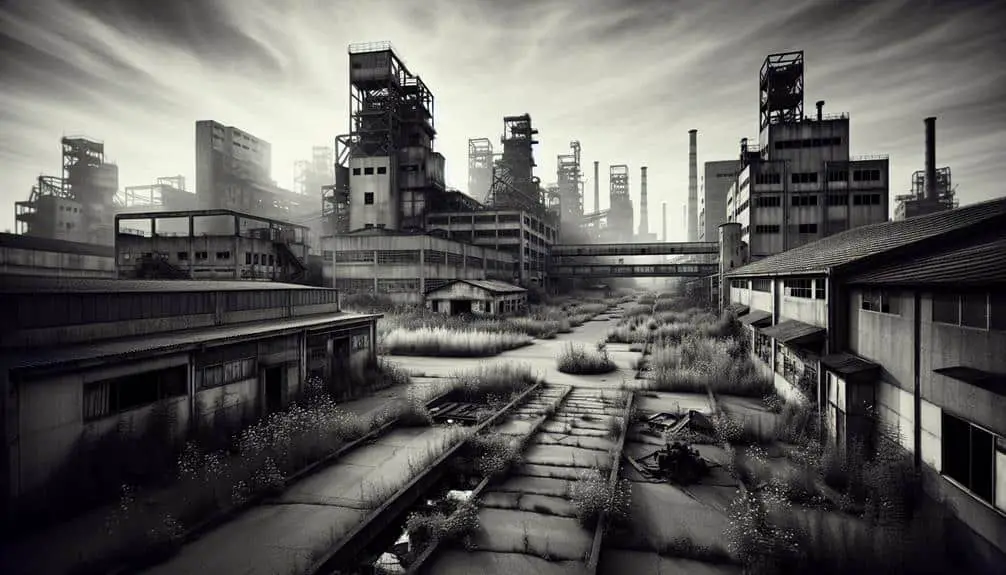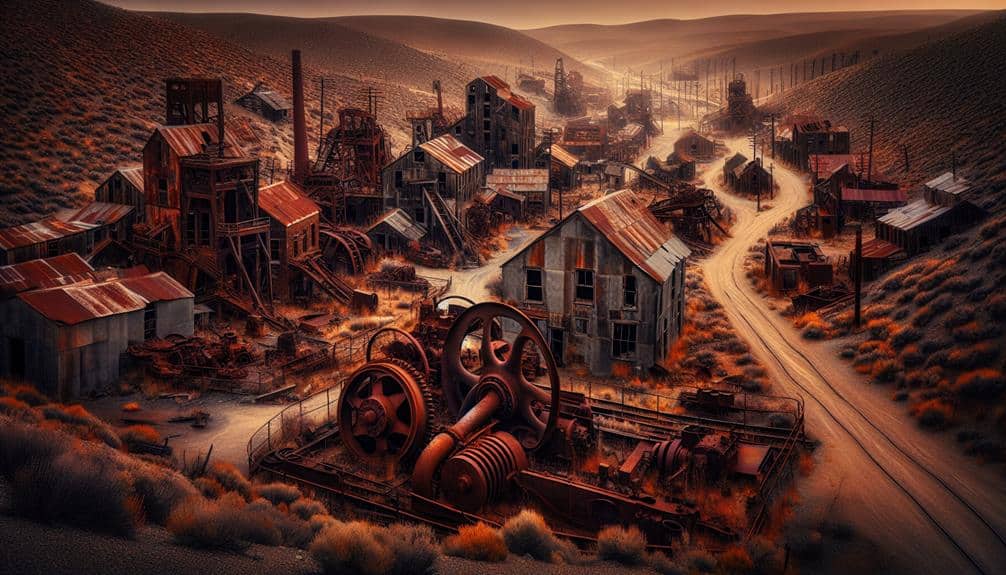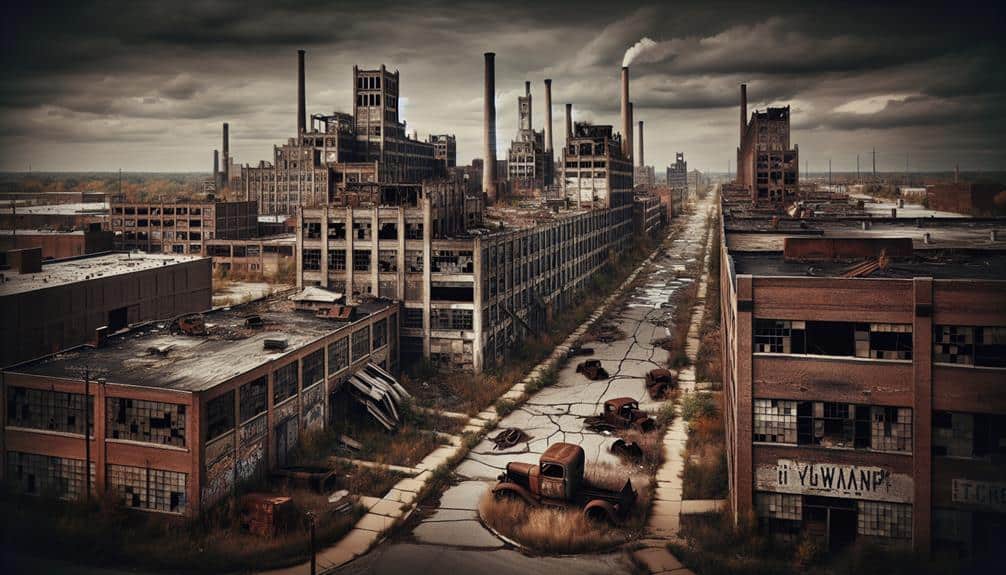The decrease of manufacturing towns occurred due to economic shifts, advanced technology causing job losses, globalized outsourcing, environmental concerns, and profound social impacts. Global market changes affected the economy. Automation replaced manual labor. Outsourcing for cheaper labor led to job losses. Environmental regulations challenged sustainable growth. Socially, job insecurities impacted mental health. To understand the holistic factors behind the decline, consider how these elements interplay within manufacturing towns.
Key Points
- Shifting global market trends impacted demand for local manufacturing.
- Automation and technology advancements reduced the need for manual labor.
- Globalization and outsourcing practices shifted production to lower-cost regions.
- Environmental concerns led to stricter regulations affecting manufacturing operations.
- Social impacts, like job insecurities, affected mental health in manufacturing communities.
Economic Shifts Impacting Manufacturing Towns
The economic landscape of manufacturing towns has been markedly influenced by shifting global market trends. Automation challenges have led to significant changes in the manufacturing sector, impacting the traditional workforce and necessitating adaptations to remain competitive. As technology advances, tasks that were once performed by human workers are now being automated, requiring a workforce that's skilled in operating and maintaining these new systems.
In response to these challenges, workforce retraining opportunities have emerged as an essential component for the revitalization of manufacturing towns. Retraining programs aim to equip workers with the necessary skills to thrive in a more automated environment, ensuring their continued employability. By investing in retraining initiatives, manufacturing towns can bridge the gap between outdated skill sets and the demands of modern industry, fostering economic growth and stability.
It is essential for manufacturing towns to embrace these workforce retraining opportunities to navigate the automation challenges and secure a prosperous future in the evolving global market.
Technological Advancements and Job Loss
Technological advancements in the manufacturing sector have led to job losses as automation continues to reshape the workforce landscape. The impact of automation on manufacturing jobs can't be underestimated. As machines become more sophisticated, repetitive and manual tasks once performed by humans are now efficiently carried out by robots and automated systems. This automation impact has resulted in significant workforce displacement, particularly in manufacturing towns where the economy heavily relies on factory jobs.
The shift towards automation has led to a decrease in the demand for human labor in manufacturing processes. While this technological progress has increased efficiency and productivity in the manufacturing sector, it has also caused a reduction in job opportunities for individuals without specialized skills or education to operate and maintain these advanced machines. As a result, many workers in manufacturing towns have found themselves facing unemployment or the need to acquire new skills to remain competitive in an increasingly automated workforce.
Globalization and Outsourcing Effects
Globalization and outsourcing practices have greatly impacted the economic sustainability of manufacturing towns worldwide. Labor displacement is a significant consequence of these practices, as companies seek cheaper labor in other countries, leading to job losses in manufacturing towns. This shift in production to countries with lower labor costs has resulted in a decline in employment opportunities for local workers, contributing to the economic downturn of these towns.
Moreover, supply chain disruptions have also played a role in the challenges faced by manufacturing towns. Outsourcing production to different countries has made supply chains more complex and vulnerable to external factors such as political instability or natural disasters. When disruptions occur, manufacturing towns can experience delays in receiving essential parts or materials, affecting production schedules and overall economic stability.
Environmental Concerns and Regulations
Amidst the evolving landscape of manufacturing towns, environmental concerns and regulations pose a critical challenge to their sustainable development. Pollution control measures have become a focal point as manufacturing activities can have a substantial impact on the environment. From air and water pollution to waste generation, the environmental impact of manufacturing is a pressing issue that requires attention.
Regulatory compliance plays a vital role in addressing these concerns. Stricter environmental regulations have been put in place to make sure that manufacturing industries adhere to necessary standards. Non-compliance can lead to fines, sanctions, or even shutdowns. Balancing industry practices with environmental sustainability is important for the long-term viability of manufacturing towns.
Industry practices need to evolve to meet these challenges. Implementing cleaner technologies, improving waste management systems, and investing in sustainable practices are essential steps towards mitigating the environmental impact of manufacturing. By embracing these changes and prioritizing environmental responsibility, manufacturing towns can navigate the complex landscape of environmental concerns and regulations while aiming for sustainable development.
Social Impacts on Manufacturing Communities
A significant number of manufacturing communities are experiencing profound social impacts due to shifts in industry dynamics and workforce trends. As factories close or downsize, individuals face job insecurities leading to increased stress and anxiety, affecting their mental health. Studies show that in areas heavily reliant on manufacturing, there's a higher prevalence of mental health issues among residents compared to national averages.
Community support plays a vital role in mitigating these social impacts. When manufacturing jobs disappear, local organizations and government bodies need to step in to provide resources for retraining programs, mental health services, and job placement assistance. Building a robust support network can help individuals navigate the challenges of moving to new careers or coping with job loss, ultimately fostering a healthier community environment.
Frequently Asked Questions
What Role Did Government Policies Play in the Decline of Manufacturing Towns?
Government intervention impacted manufacturing towns by introducing policies that shifted economic dynamics, affecting industries and job availability. These actions shaped the decline, highlighting the critical role of policy decisions in shaping local economies.
How Have Changing Consumer Preferences Affected the Manufacturing Industry in These Towns?
As changing technology revolutionizes industries, consumer behavior shifts, impacting manufacturing towns. Embrace these shifts by adapting production to align with consumer preferences and leveraging technology to stay competitive in the evolving marketplace.
Are There Any Success Stories of Manufacturing Towns That Have Managed to Adapt and Thrive in the Face of Economic Challenges?
You can find success stories in manufacturing towns that thrived by implementing adaptive strategies and fostering community engagement. These towns embraced change, invested in innovation, and collaborated with local residents to overcome economic challenges and secure a prosperous future.
What Are the Implications of Automation and Artificial Intelligence on the Future of Manufacturing Jobs in These Towns?
When pondering the implications of automation and artificial intelligence on manufacturing towns, it's vital to understand the impact of technology on job displacement. Currently, studies show that 73% of manufacturing job losses are due to automation.
How Have Changes in Transportation and Logistics Systems Impacted Manufacturing Towns?
Changes in transportation and logistics systems, driven by globalization, have greatly affected manufacturing towns. Supply chain disruptions have resulted in job losses and economic challenges. Understanding these dynamics is vital for maneuvering the future effectively.



